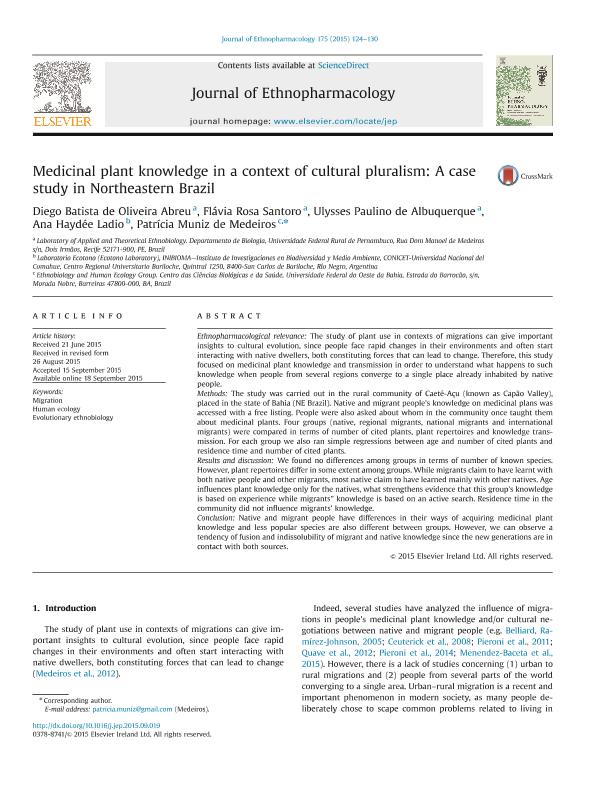Mostrar el registro sencillo del ítem
dc.contributor.author
Abreu, Diego Batista de Oliveira
dc.contributor.author
Santoro, Flavia Rosa
dc.contributor.author
Albuquerque, Ulysses Paulino de
dc.contributor.author
Ladio, Ana Haydee

dc.contributor.author
Medeiros, Patricia Muniz de
dc.date.available
2017-01-20T21:19:30Z
dc.date.issued
2015-06
dc.identifier.citation
Abreu, Diego Batista de Oliveira; Santoro, Flavia Rosa; Albuquerque, Ulysses Paulino de; Ladio, Ana Haydee; Medeiros, Patricia Muniz de; Medicinal plant knowledge in a context of cultural pluralism: a case study in Northeastern Brazil; Elsevier Ireland; Journal Of Ethnopharmacology; 175; 6-2015; 124-130
dc.identifier.issn
0378-8741
dc.identifier.uri
http://hdl.handle.net/11336/11719
dc.description.abstract
Ethnopharmacological relevance
The study of plant use in contexts of migrations can give important insights to cultural evolution, since people face rapid changes in their environments and often start interacting with native dwellers, both constituting forces that can lead to change. Therefore, this study focused on medicinal plant knowledge and transmission in order to understand what happens to such knowledge when people from several regions converge to a single place already inhabited by native people.
Methods
The study was carried out in the rural community of Caeté-Açu (known as Capão Valley), placed in the state of Bahia (NE Brazil). Native and migrant people's knowledge on medicinal plans was accessed with a free listing. People were also asked about whom in the community once taught them about medicinal plants. Four groups (native, regional migrants, national migrants and international migrants) were compared in terms of number of cited plants, plant repertoires and knowledge transmission. For each group we also ran simple regressions between age and number of cited plants and residence time and number of cited plants.
Results and discussion
We found no differences among groups in terms of number of known species. However, plant repertoires differ in some extent among groups. While migrants claim to have learnt with both native people and other migrants, most native claim to have learned mainly with other natives. Age influences plant knowledge only for the natives, what strengthens evidence that this group's knowledge is based on experience while migrants'’ knowledge is based on an active search. Residence time in the community did not influence migrants’ knowledge.
Conclusion
Native and migrant people have differences in their ways of acquiring medicinal plant knowledge and less popular species are also different between groups. However, we can observe a tendency of fusion and indissolubility of migrant and native knowledge since the new generations are in contact with both sources.
dc.format
application/pdf
dc.language.iso
eng
dc.publisher
Elsevier Ireland

dc.rights
info:eu-repo/semantics/openAccess
dc.rights.uri
https://creativecommons.org/licenses/by-nc-nd/2.5/ar/
dc.subject
Migrations
dc.subject
Human Ecology
dc.subject
Evolutionary Ethnobiology
dc.subject.classification
Otras Ciencias Biológicas

dc.subject.classification
Ciencias Biológicas

dc.subject.classification
CIENCIAS NATURALES Y EXACTAS

dc.title
Medicinal plant knowledge in a context of cultural pluralism: a case study in Northeastern Brazil
dc.type
info:eu-repo/semantics/article
dc.type
info:ar-repo/semantics/artículo
dc.type
info:eu-repo/semantics/publishedVersion
dc.date.updated
2016-12-12T14:34:57Z
dc.journal.volume
175
dc.journal.pagination
124-130
dc.journal.pais
Irlanda

dc.journal.ciudad
Amsterdam
dc.description.fil
Fil: Abreu, Diego Batista de Oliveira. Universidade Federal Rural Pernambuco. Departamento de Biologia. Laboratorio de Etnobotanica Aplicada; Brasil
dc.description.fil
Fil: Santoro, Flavia Rosa. Universidade Federal Rural Pernambuco. Departamento de Biologia. Laboratorio de Etnobotanica Aplicada; Brasil
dc.description.fil
Fil: Albuquerque, Ulysses Paulino de. Universidade Federal Rural Pernambuco. Departamento de Biologia. Laboratorio de Etnobotanica Aplicada; Brasil
dc.description.fil
Fil: Ladio, Ana Haydee. Consejo Nacional de Investigaciones Científicas y Técnicas. Centro Científico Tecnológico Patagonia Norte. Instituto de Investigación En Biodiversidad y Medioambiente; Argentina. Universidad Nacional del Comahue; Argentina
dc.description.fil
Fil: Medeiros, Patricia Muniz de. Universidade Federal do Oeste da Bahía; Brasil
dc.journal.title
Journal Of Ethnopharmacology

dc.relation.alternativeid
info:eu-repo/semantics/altIdentifier/url/http://www.sciencedirect.com/science/article/pii/S0378874115301446
dc.relation.alternativeid
info:eu-repo/semantics/altIdentifier/doi/http://dx.doi.org/10.1016/j.jep.2015.09.019
Archivos asociados
